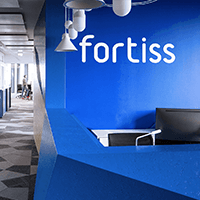The wide range of opportunities that digitalization offers was illustrated once again during the last weekend of September in Pfaffenhofen an der Ilm. At the second annual trades industry hackathon, skilled tradespeople, entrepreneurs and programmers gathered together to develop digital business models with a focus on determining how innovative concepts can simplify daily life.
The second annual “Hackathon Handwerk”, which was held in Baar-Ebenhausen in the Bavarian county of Pfaffenhofen, was organized by fortiss, the Kommunalunternehmen Strukturentwicklung Landkreis Pfaffenhofen (KUS), the Digitale Gründerzentrum der Region (brigk), Bayernwerk Netz GmbH, the Chamber of Trades Industry for Munich and Upper Bavaria, BIM World Munich and the Center of Competence for Digital Trades Industry. The event partners have been collaborating for a number of years with fortiss in order to successfully carry out the digital transformation of the traditional trades industry.
At the conclusion of the two days, three visionary solutions evolved from a large number of exciting working groups, including the watering app, a special greenhouse application. Three young developers managed to create an app that controls not only the watering system, but also the ventilators and humidity levels inside of a greenhouse. The second application is a tracking app for lost and misplaced medical equipment. A company that specializes in renting this type of equipment suffers from the frequent problem of missing contents when the equipment cases are returned. Locating the costly instruments again is a difficult and time-consuming task. The application is designed to provide assistance in these situations.
The winner of the hackathon, which ran from noon on Friday to Saturday afternoon, was an application that monitors visitors to places such as trade fairs, festivals or swimming pools and analyzes the data. The information is used to track the number of visitors, their movements, whether they maintain their distance, how long they stay or how long they remain at a particular booth for instance.
Although originally intended solely as software and hardware development events, growing numbers of small-to-medium enterprises (SMEs) are taking advantage of hackathons to develop creative solutions within a period of only 1 to 2 days. The format brings young programmers together with companies that have a problem to solve. Both sides have the chance to turn their ideas into reality and test them with an initial prototype. Codrina Lauth, a scientist at fortiss, was responsible for co-establishing the concept at the institute and further developing it over many years. But for her, the concept is not only about the rapid development of new solutions. “Particularly with regional hackathons, it’s also about the economic impact and the long-term synergies that we want create anew and implement in a concrete manner together with the companies and for people in the region through digital concepts and prototypes,” she says, adding that she is convinced that “digitalization is nothing more than creating something new together.”



